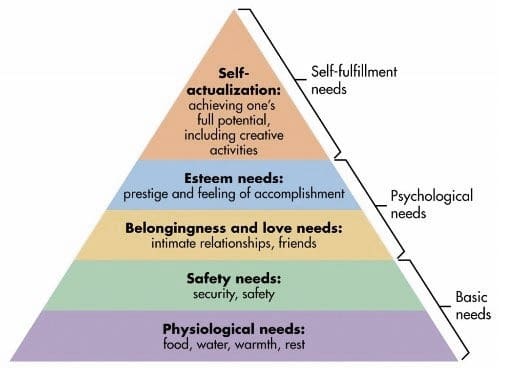As mentioned last week, we often find ourselves intentionally or unintentionally doing things.
Have you ever given a thought to motivation – why do we do some things? Is it due to selfish desires or a mixture of that and a higher calling?
These motives can be explained for a number of reasons: mentally, physically and spiritually.
A popular theory of human motivation which we will discuss is Maslow’s Hierarchy of Needs, where he explained motivation to only occur after we go through steps to fulfil each goal, or in Maslow’s terms, ‘needs’.
Abraham Maslow wanted to understand what motivates people. He believed that people possess a set of motivation systems unrelated to rewards or unconscious desires. According to him, human motivation is based on people seeking fulfilment and change through personal growth.
Maslow (1943) stated that people are motivated to achieve certain needs, and that some needs take precedence over others. Our most basic need is for physical survival, and this will be the first thing that motivates our behaviour. Once that level is fulfilled the next level up is what motivates us, and so on, show on the diagram below:

According to Maslow’s hierarchy of needs; it is a human’s function that motivates behaviour and experience (Maslow, 1943). An individual works their way towards gaining self-actualisation by achieving and exploring the other lower level needs. Self-actualized people are those who are fulfilled and doing all they are capable of.
This theory has come into a lot of criticism, since the main drawback is it cannot be tested. There is no tool that can measure how satisfied the individual is at one level (do we ever get fully satisfied?), before going to the other nor the existence of a definite hierarchy.
Motivation is more than just going up the ladder to go through goals and sometimes we may categorise needs differently as well as work through more than one ‘need’ at the same time. People may start at different levels or even fail to achieve a need but still keep trying.
Happiness may be rooted in having one’s needs and desires satisfied, but simply satisfying needs is too basic to explain human motivation. Maslow ignores that needs can be based around and satisfied through human connections and collaborations, rather than selfishly achieving needs. Needs are not hierarchal because in reality, life is messier than that, and as such needs are an interactive, dynamic system with the ability to make shared connections.
Understandably goals provide a sense for living and purpose of behaviour which can contribute to lasting patterns of effective development (Carver & Scheier, 1998) therefore not pursuing or reaching a goal has a consequence on the individual and life view. Research suggests that it may be adaptive for individuals that are unable to achieve or follow new goals to continue making an effort in reaching the unfeasible goal, because then an individual still has a pursuit in their life (Wrosch, Scheier & Miller 2013).
Of course, religion i.e. spiritual needs and pursuits can also be a means of motivation e.g. goal to achieve Jannah Al-Firdaus, so Maslow’s theory doesn’t account for this.
Are there any verses of the Qu’ran, ahadith or quotes that help keep you motivated? Let us know!




